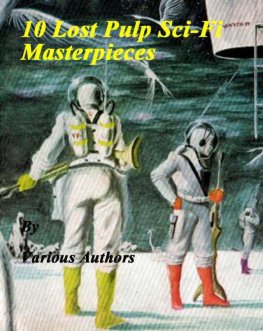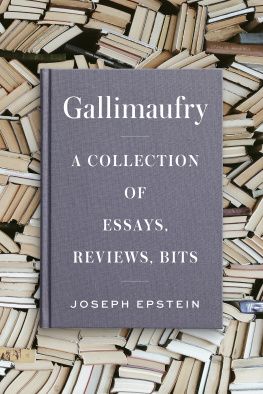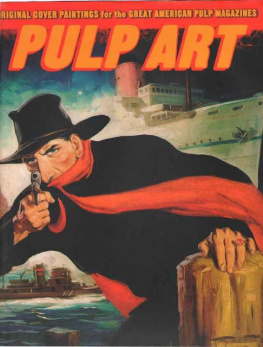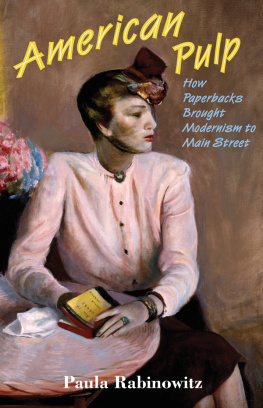Joseph Bottum - Pulp & Prejudice: Essays in Search of Books, Culture, and God
Here you can read online Joseph Bottum - Pulp & Prejudice: Essays in Search of Books, Culture, and God full text of the book (entire story) in english for free. Download pdf and epub, get meaning, cover and reviews about this ebook. year: 2012, genre: Detective and thriller. Description of the work, (preface) as well as reviews are available. Best literature library LitArk.com created for fans of good reading and offers a wide selection of genres:
Romance novel
Science fiction
Adventure
Detective
Science
History
Home and family
Prose
Art
Politics
Computer
Non-fiction
Religion
Business
Children
Humor
Choose a favorite category and find really read worthwhile books. Enjoy immersion in the world of imagination, feel the emotions of the characters or learn something new for yourself, make an fascinating discovery.

- Book:Pulp & Prejudice: Essays in Search of Books, Culture, and God
- Author:
- Genre:
- Year:2012
- Rating:3 / 5
- Favourites:Add to favourites
- Your mark:
- 60
- 1
- 2
- 3
- 4
- 5
Pulp & Prejudice: Essays in Search of Books, Culture, and God: summary, description and annotation
We offer to read an annotation, description, summary or preface (depends on what the author of the book "Pulp & Prejudice: Essays in Search of Books, Culture, and God" wrote himself). If you haven't found the necessary information about the book — write in the comments, we will try to find it.
Pulp & Prejudice: Essays in Search of Books, Culture, and God — read online for free the complete book (whole text) full work
Below is the text of the book, divided by pages. System saving the place of the last page read, allows you to conveniently read the book "Pulp & Prejudice: Essays in Search of Books, Culture, and God" online for free, without having to search again every time where you left off. Put a bookmark, and you can go to the page where you finished reading at any time.
Font size:
Interval:
Bookmark:
Pulp & Prejudice:
Essays in Search of
Books, Culture, and God
Joseph Bottum
2012; all rights reserved
second revision
Cover photo: Lin Kristensen, via WikiMedia Commons
Table of Contents
:
a.
b.
c.
d.
Preface
These essays have all appeared in print, in earlier or edited versions, at various points over the last few yearsin the pages of the Atlantic , the Weekly Standard , Policy Review , Books & Culture , and other magazines and journals. Some of them have even been anthologized before: in the annual Best Christian Writing series, edited by John Wilson, for example, and the annual Best Spiritual Writing series, edited by Philip Zaleski. All of which is a way of saying that these essays are not rare, strange, esoteric things. They had their time, they had their run, and nowwell, now, what?
Perhaps their time has come and gone; perhaps their race is run. My hope, however, is that, gathered together, they might have a chance to do what they could not do when they were first appearing, scattered across the pages of different issues of different magazines.
And what they might now do, joined in a e-book volume, is begin to inform one anotherbegin to stay up late at night, side by side, and start a conversation among themselves. How interesting that conversation will prove remains to be seen. Maybe youll let me know how it comes out, once youve had a chance to sit up with them and listen in.
The Black Hills
Summer 2012
Adventures in Arabia:
Heroism and T.E. Lawrence
He was the best of England and the worst. A wastrel, in many ways, and a triumph, in others. A hero and a clown. A scholar and a soldier. A sophisticate and a naf. A child and a grown-up. He was an adolescent , all in all: perhaps the greatest lifelong teenager the modern world has ever known, with every bit of the soaring self-confidence and crushing self-doubt the awkward years can bring.
His name was Lieutenant Colonel Thomas Edward Lawrence. Or T.E. Lawrence , as he signed his books, or John Hume Ross and T.E. Shaw , the military pseudonyms under which he was concealed during the 1920s and 1930sand notice, even in the ways he named himself, the inverted boast and the adolescent fantasy of famously hiding from fame. Of course, in his case, it wasnt fantasy. It was simple reality, for he managed to be that unique figure, that strange bird, for whom it all came true. And thats because, as Michael Korda notes in a recent biography, he was always Lawrence of Arabia the strange short man (only five-foot-five) who towered above his contemporaries: an odd gnome, half cadwith a touch of genius, as one soldier who served with him observed.
What, in the end, are we to make of a nearly perfect soldier who was so psychologically crippled that, once he returned to England, he felt compelled to hire men to beat him? And that, even while he was producing the elegant prose of The Seven Pillars of Wisdom , his magisterial account of the Arab Revolt during the First World War?
As it happens, after the failure of direct attack on the Ottoman Empire in the disaster of the Gallipoli campaign in 1915, much of the British high command considered the Middle Eastern theater a distraction from the main action of the war in Franceand the Arab rising against the Ottomans even more of a distraction: a sideshow of a sideshow, as one officer complained at the time. But with the help of Lowell Thomas (a cynical American journalist prone to hero-worshipping, and no stranger himself to internal contradictions), Lawrence turned the Arab Revolt into center stage: the whole world watching as he battled his demons and the Turks across the ancient desert.
Being Lawrence, he couldnt just write the book about those days, once he returned to England. He had to agonize over it, and toy with it, and dismiss it, and devote himself to it. He rewrote the manuscript several timesonce after losing it at the Reading train station, which is about as clear a symbol of psychological ambivalence as one is likely to findbefore finally publishing the text in 1922 in an edition of eight copies. Convinced by his friends, notably the poet Robert Graves, that he ought to make it more widely available, he abridged the book somewhat and issued it in 1926 as a special subscribers edition.
In the event, more widely available meant that he allowed two hundred copies to be made, a hundred of which he sold for thirty guineas each, although the illustrations and hand-binding made the book nearly double that price to produce. The result was near bankruptcy, and he was forced, finally, to do what he ought to have done from the beginningprepare a short version for general readers: the 1927 Revolt in the Desert , an abridgement of an abridgement, as George Bernard Shaw sneered. It sold extraordinarily well and paid off his debts, which allowed him to hide, again, in the Royal Air Force as a mechanic under an assumed name.
What a circus. On and on goes the adolescent unity of contradictions that was T.E. Lawrence. The illegitimate son of a minor aristocrat, he far surpassed his father in fame and accomplishment, but he never quite got over the fact of his bastardry. He was a natural leader, who mostly wanted to be alone. By all accounts a gentle man aimed, by predilection and education, at a scholars life, he was also a ruthless killer. Like Lord Byron during the Greek uprisings against the Turks in the early nineteenth century, Lawrence showed the surprising practicality that dreamers sometimes have, understanding far better than his contemporaries just what gold and guns could accomplish. He showed, as well, the surprising brutality of dreamers: executing one of his own men to prevent a blood feud and admitting, to British dismay, that his Arab forces had slaughtered Turkish prisoners.
He seemed, in many ways, a character out of time. Dispatches from the Western Front were filled with reportsYpres, Verdun, the Somme, Passchendaeleof thousands upon thousands dead, gassed, shell-shocked, or lost, all for tiny gains of ground. In the four months of the 1916 Somme campaign, the Allied forces managed to advance a mere seven miles, at the cost of 420,000 British casualties, 200,000 French, and 500,000 German. Meanwhile, Lawrence was filing dispatches of battles that seemed almost Victorian in their numbers and their victories: 300 Turks killed and a town captured, for example, at the cost of two of his Bedouin men killed. In a letter to a friend, he laconically described a 1917 attack on the railroad: The whole job took ten minutes, and they lost 70 killed, 30 wounded and 80 prisoners. His Arab forces suffered only one casualty, although they had to flee when a major Turkish rescue force arrived: I lost some baggage, and nearly myself, he added. Im not going to last out this game much longer: nerves going and temper wearing thin.... This killing and killing of Turks is horrible.
Simply as a commander, T.E. Lawrence proved he could do serious, theater-wide strategy. Ill with dysentery early in the war, he used the time to plan the campaign he and Prince Feisal would attempt (implementing a general strategy that came, it should be noted, not from Lawrence but from the British Arab Bureau). It would start by abandoning the old Arab plan of driving the Turks out of Medina and the other Arabian cities. The true success of the Arab Revolt, Lawrence saw, depended on taking from the Ottomans the northern cities: Jerusalem and Damascus, particularly. So he would begin with a series of pin-prick attacks on railroads, telegraph wires, and small outposts, forcing the Turks to spread their forces across the Middle East and alerting the squabbling Arab tribes to the unifying figure of Feisal. The next step would be the acquisition of Aqaba, a sea-port at which to receive British supplies. And the final step would be the building of a serious army with which to hold the ground gained by the Ottomans retreat back to Turkey.
Next pageFont size:
Interval:
Bookmark:
Similar books «Pulp & Prejudice: Essays in Search of Books, Culture, and God»
Look at similar books to Pulp & Prejudice: Essays in Search of Books, Culture, and God. We have selected literature similar in name and meaning in the hope of providing readers with more options to find new, interesting, not yet read works.
Discussion, reviews of the book Pulp & Prejudice: Essays in Search of Books, Culture, and God and just readers' own opinions. Leave your comments, write what you think about the work, its meaning or the main characters. Specify what exactly you liked and what you didn't like, and why you think so.







